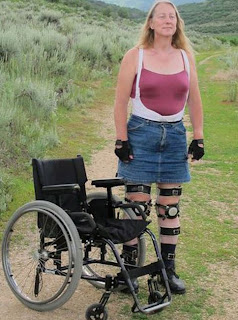
“Something in my brain tells me my legs are not supposed to work. Having any sensation in them just feels wrong,” says Chloe Jennings-White. She has said she wants a surgeon to cut her spinal cord. She wants to live in a wheel chair for the rest of her life. Is she crazy? Does she want disability payments?
None of the above. The cause is either organic within the brain or a profound psychological disturbance.
The era in which we live has a name for her situation. She is transabled. She has felt this way since she was four years old.
She thought she was a freak until one day. Read on.
None of the above. The cause is either organic within the brain or a profound psychological disturbance.
The era in which we live has a name for her situation. She is transabled. She has felt this way since she was four years old.
She thought she was a freak until one day. Read on.













